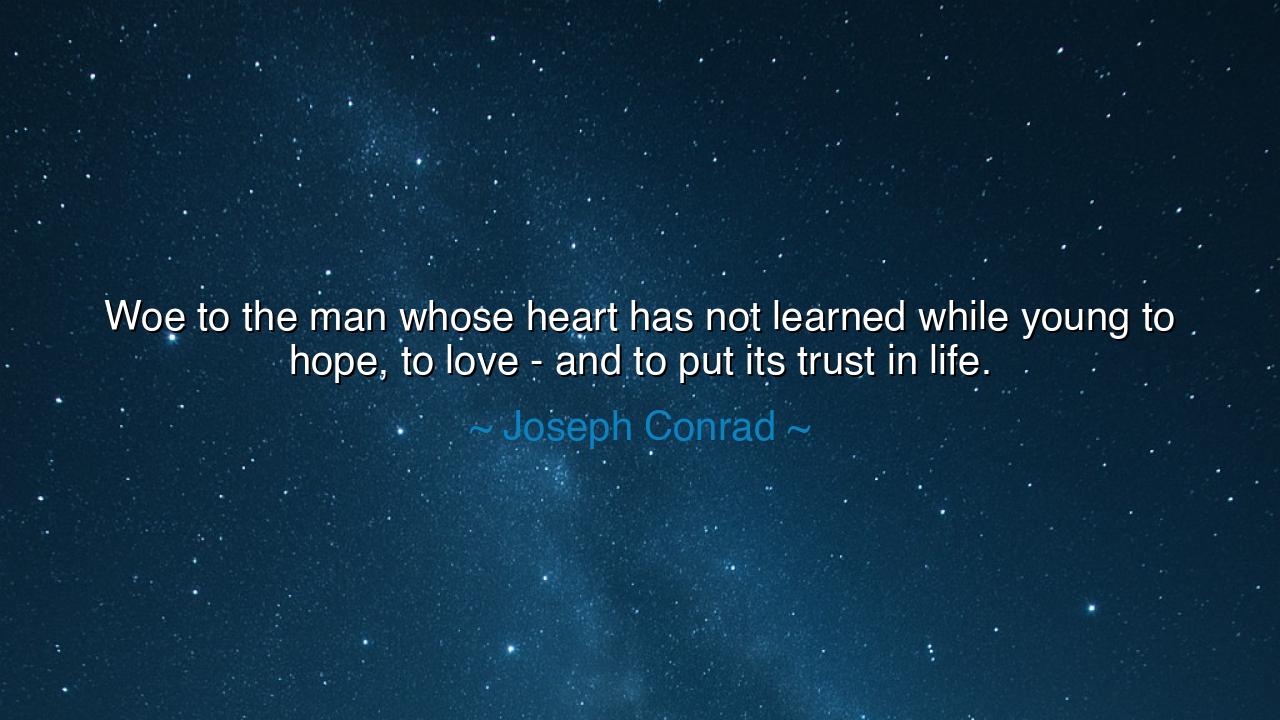
Woe to the man whose heart has not learned while young to hope
Woe to the man whose heart has not learned while young to hope, to love - and to put its trust in life.






“Woe to the man whose heart has not learned while young to hope, to love — and to put its trust in life.” Thus spoke Joseph Conrad, the sailor of the human soul, whose stories navigated both the light and the shadows of existence. In these few words, he delivers not merely a warning, but a lament for lost innocence, a plea for the spirit to remain unbroken by cynicism. He tells us that hope, love, and trust in life are not mere comforts — they are the very lifeblood of the human heart. Without them, a man becomes hollow, drifting through the world as a vessel without sail or star to guide him.
Conrad’s wisdom was born from hardship and wandering. Before he became a writer, he was a sailor who crossed vast oceans and darker inner seas. He witnessed cruelty, isolation, and the frailty of human nature — yet he also glimpsed courage, tenderness, and beauty in the midst of despair. Out of this duality, he forged his philosophy: that life, though harsh and uncertain, is still worthy of trust. To live fully is to dare to believe in the good, even when surrounded by storms. Thus his warning: “Woe to the man…” — for the one who closes his heart against life’s pain also shuts it against its joy.
To “hope” is to look toward tomorrow with faith that the sun will rise, even when clouds conceal it. To “love” is to open oneself to both joy and vulnerability, knowing that only through love do we find meaning. And to “trust in life” is to walk forward even when the path is uncertain, to believe that the thread of destiny, though tangled, still leads somewhere worthy. Conrad knew that those who fail to learn these lessons when young — when the soul is still soft and open — often grow into adults hardened by disappointment. They lose the ability to feel wonder, to forgive, to dream. And such a loss, he tells us, is a kind of living death.
Consider the story of Anne Frank, a child whose heart embodied every word of Conrad’s wisdom. Trapped in hiding during the terror of war, she wrote of hope, love, and faith in humanity. “In spite of everything,” she said, “I still believe that people are really good at heart.” Though the world around her crumbled, her spirit remained uncorrupted. Her heart, young yet immeasurably wise, had learned the three sacred lessons: to hope in the face of despair, to love in the midst of hatred, and to trust life even when it offered no mercy. Her words survived even when her body did not — proof that such virtues make the soul immortal.
Conrad’s warning also carries the wisdom of balance. Hope must not blind us to truth; love must not enslave us; trust must not become naïveté. Yet without these, the heart turns cold, and cynicism takes root where faith once grew. The man who refuses to trust life becomes its prisoner. He builds walls to keep out pain, but those same walls keep out light. Such a soul wanders aimlessly, fearing both loss and love, both failure and hope. Conrad calls this woe — the sorrow of the living dead, who breathe but do not feel, who exist but do not truly live.
And yet, the Master does not condemn — he invites redemption. Even those who have grown old in bitterness may still rekindle the flame. It is never too late to learn from life — to look upon the sunrise and feel wonder again, to forgive oneself and others, to reach out in love, even trembling. Life may wound, but it also heals. The one who dares to trust again, even after betrayal, rediscovers the eternal rhythm of the human spirit — the pulse that binds every soul to the living cosmos. For trust in life is not denial of suffering, but acceptance that suffering, too, has meaning.
So, my child, take this teaching to heart. When the world grows cold, guard your hope as you would a sacred flame. When pain tempts you to withdraw, choose love, for it alone gives depth to your being. And when fate turns uncertain, trust life — not blindly, but bravely, knowing that each moment, even the painful ones, is a teacher. Do not let cynicism steal your youth, even if your hair grows gray. Keep your heart supple, your soul curious, and your faith in the unseen unbroken.
For as Conrad teaches, the greatest tragedy is not to die, but to lose the ability to live with wonder. The heart that hopes, loves, and trusts is the true conqueror of time. It walks through the storms of existence not untouched, but unbroken, carrying within it the quiet knowledge that life, for all its mystery, is still good — and still worth trusting.






AAdministratorAdministrator
Welcome, honored guests. Please leave a comment, we will respond soon